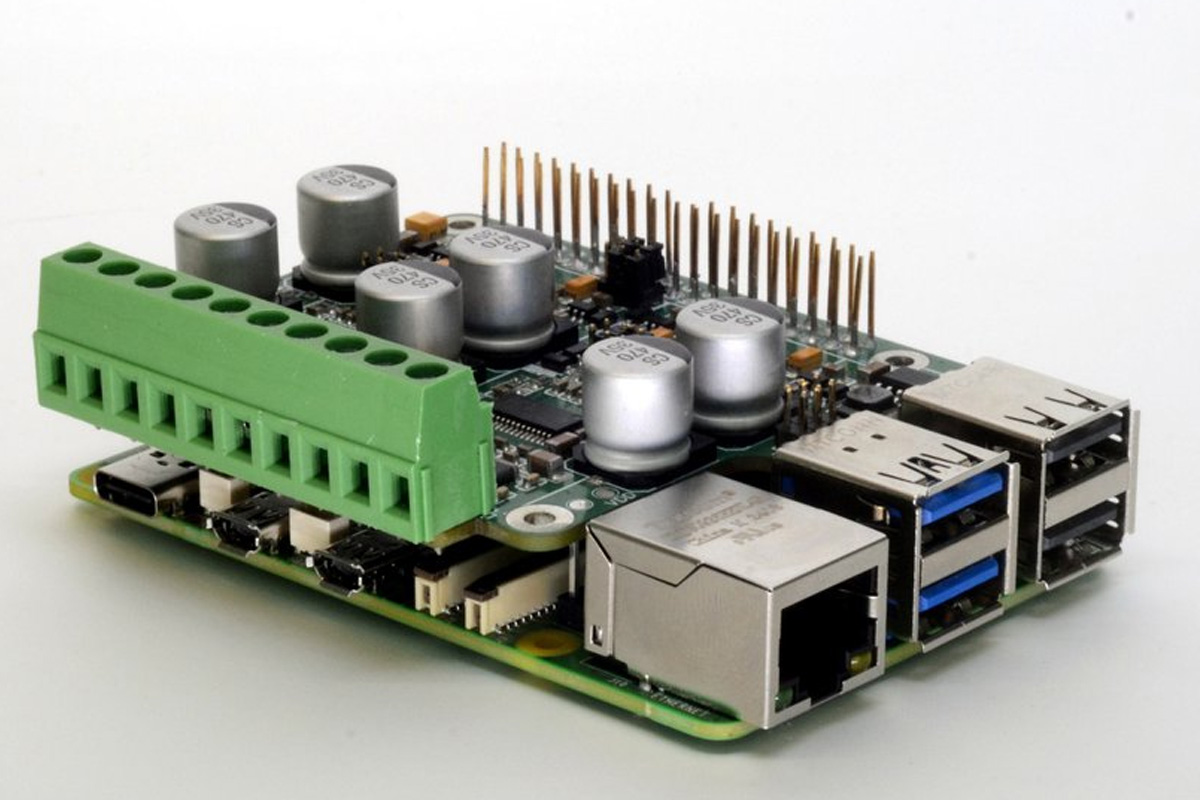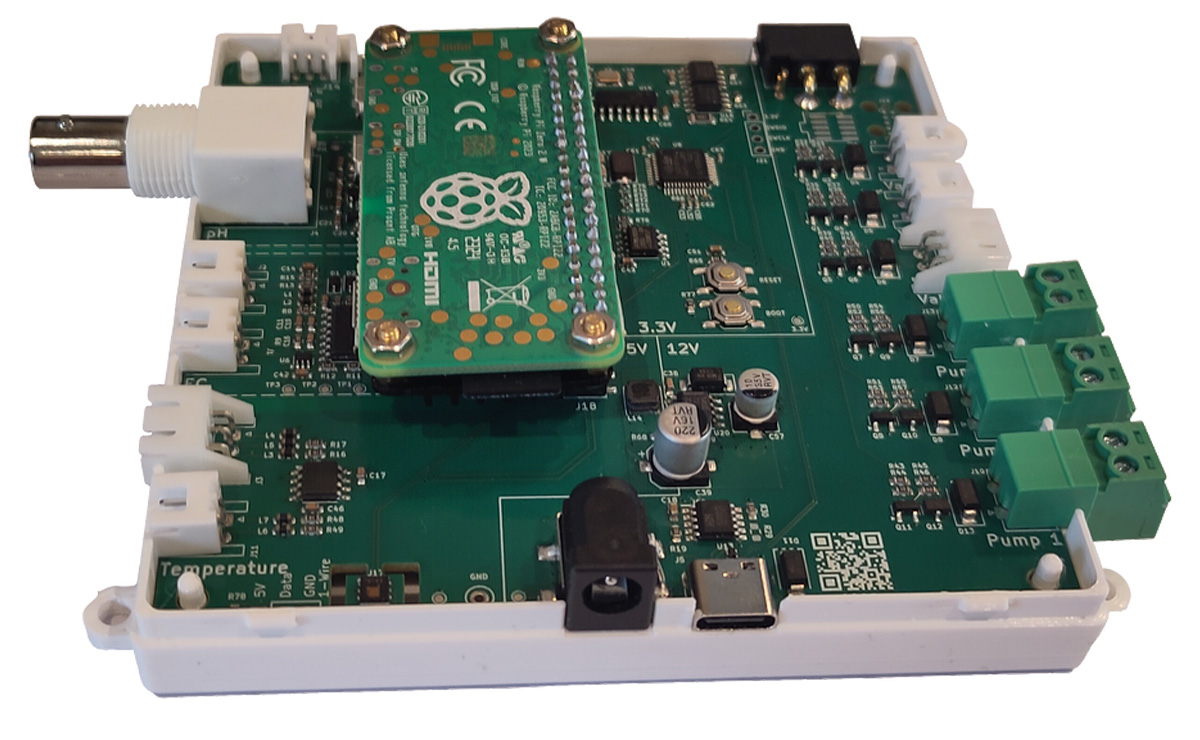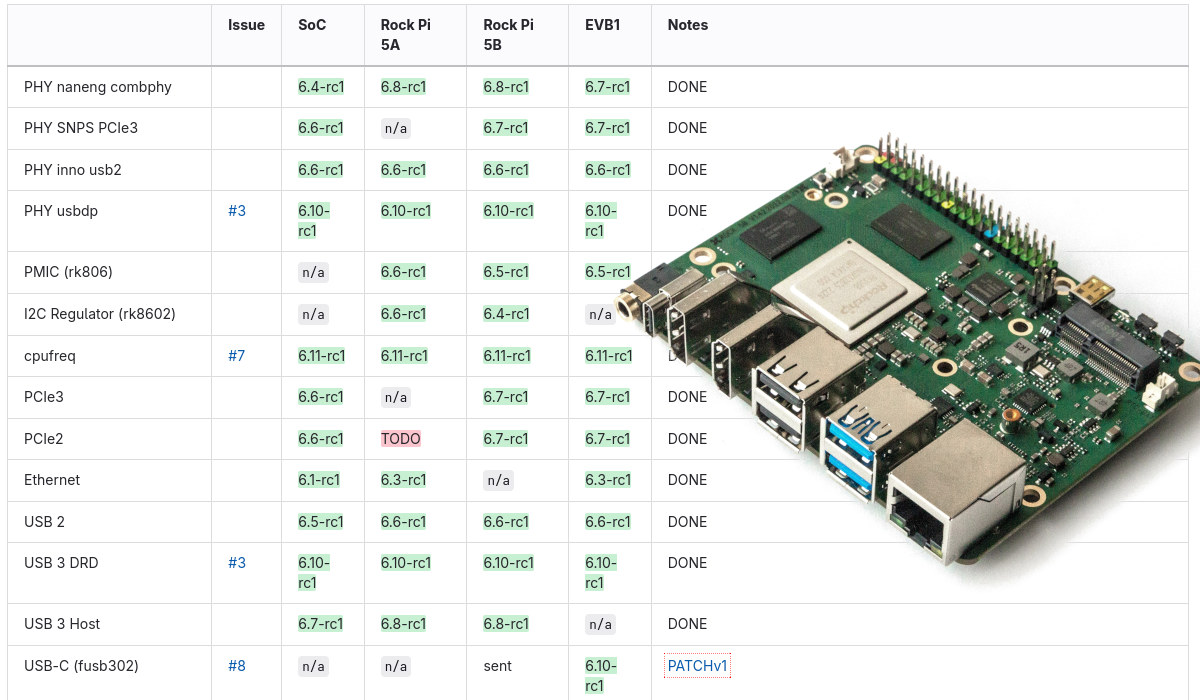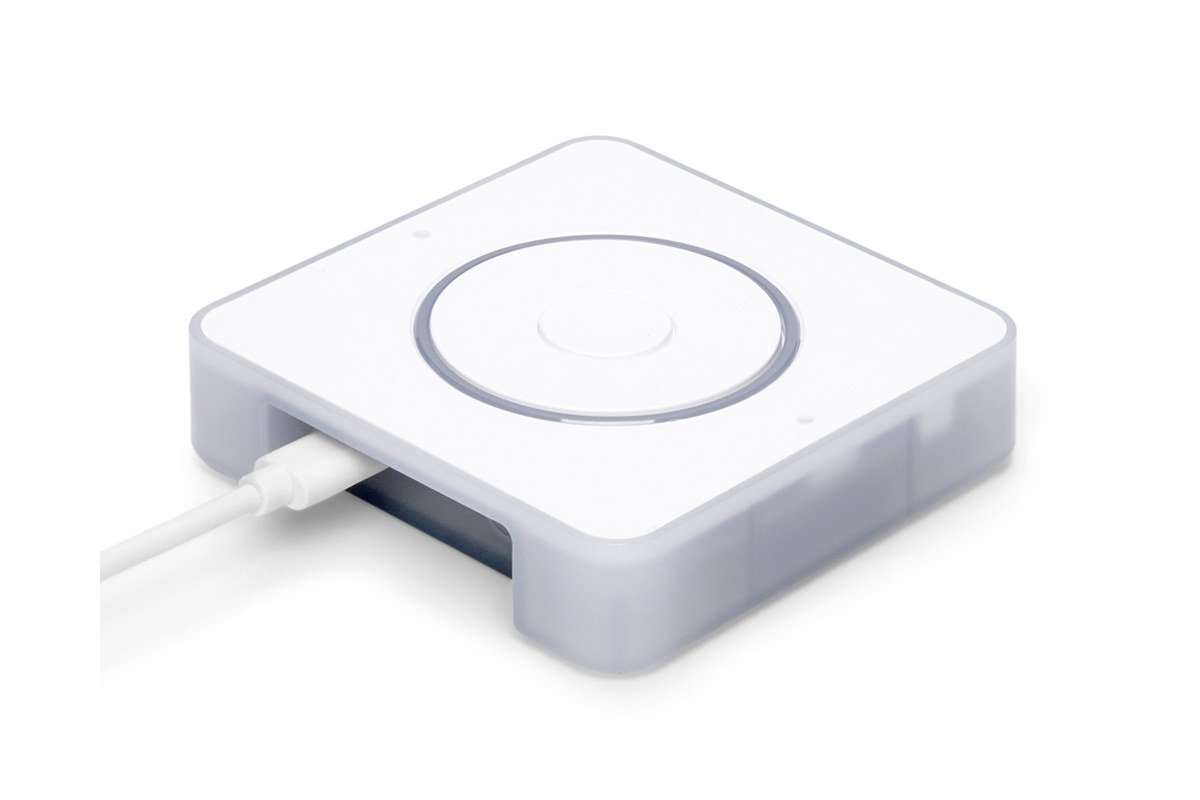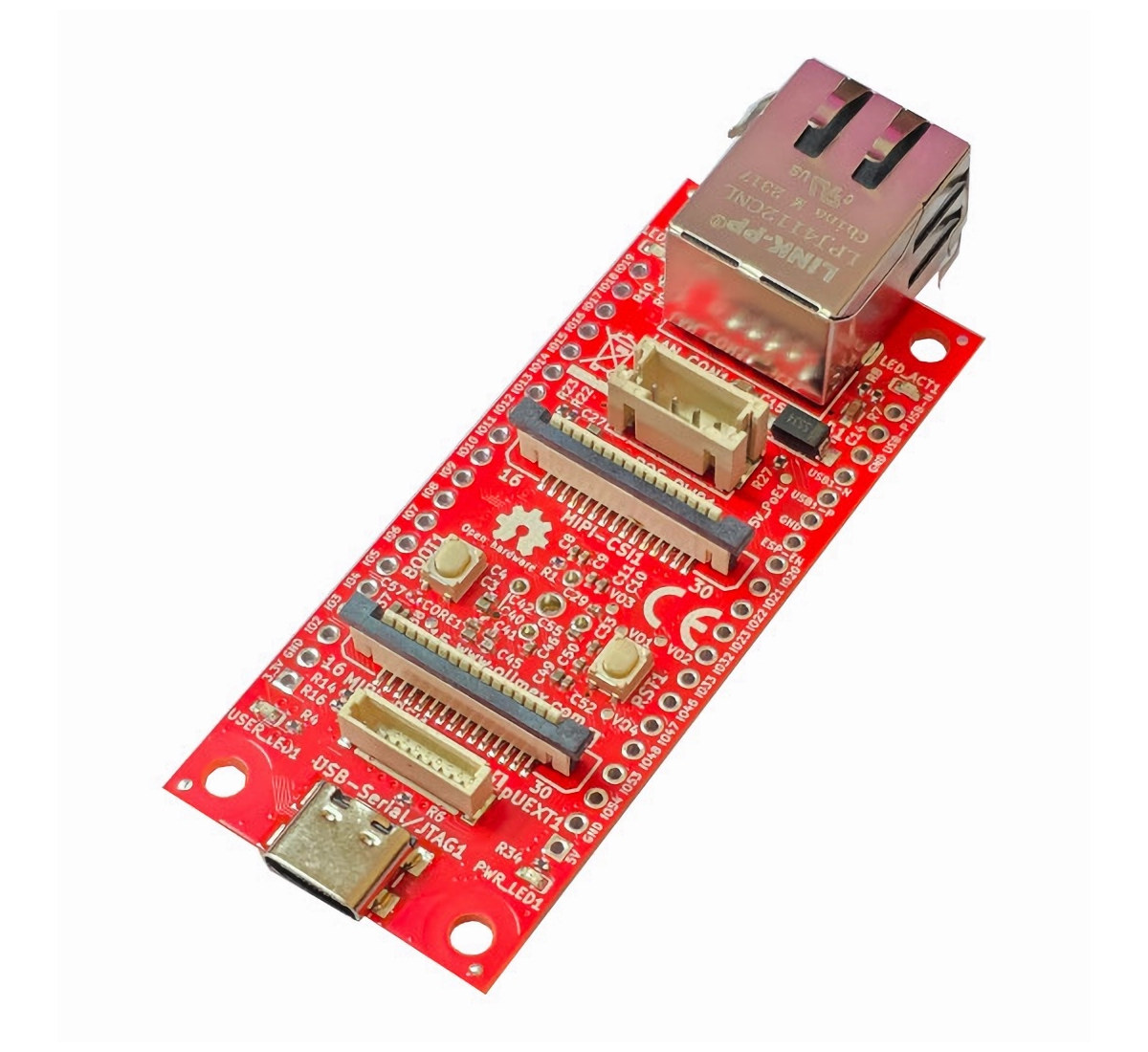Sonocotta’s HiFi-Amped is a Raspberry Pi Audio HAT designed for Raspberry Pi single-board computers. It features dual PCM5100 DACs and TPA3110 (2x15W @ 8-Ω or 1x 30-W @ 4-Ω) class D amplifiers for high sound quality and power efficiency. Key features of this module include support for both small and large speakers, an external power source to drive speakers and power the Raspberry Pi, and the ability to shut down the amplifiers using GPIO pins for minimal noise when not in use. This makes it ideal for creating a Raspberry Pi-based media center or audio streaming setup. HiFi-Amped specifications: Compatibility – Raspberry Pi 2, 3, 4, 5, Zero, and potentially others with a Raspberry Pi-compatible GPIO header Amplifier – 2x Texas Instruments TPA3110D2 Class-D amplifiers Output Power 4x 10W into 8 ohms @ 13V 4x 15W into 8 ohms @ 16V 2x 30W into 4 ohms @ 16V (bridged mode) […]
RootMaster is a Raspberry Pi Zero 2W-based hydroponic automation system with STM32G4 MCU, CAN Bus, sensors
The RootMaster is a Raspberry Pi Zero 2W-based hydroponic automation system designed to precisely manage water and environmental conditions. The solution also integrates an STM32G4 microcontroller to handle real-time operations such as controlling pumps and peripherals, managing sensors, and processing data from external sensors like water level indicators. It also generates PWM signals to control the power of connected devices and handles communication with external modules through a CAN FD interface. While STM32 handles hardware-level tasks, the Raspberry Pi Zero 2W manages high-level control and user interaction. The RootMaster can be programmed with Python, C, C++, or other programming languages and is useful for applications like Hydroponics automation, water circulation, and environmental control. RootMaster specifications MCU – STMicro STM32G473 32-bit Arm Cortex-M4 microcontroller @ 170 MHz for real-time operations Main controller – Compatible with Raspberry Pi Zero 2 WH for GUI and other interfaces Sensors pH sensor for nutrient solution […]
Rockchip RK3588 mainline Linux support – Current status and future work for 2025
The Rockchip RK3588 is one of the most popular Arm SoCs for single board computers, and while good progress has been made with regards to mainline u-boot and Linux support, the SoC is quite complex and it takes time to port all its features even though it was first teased in 2020 and the first Rockchip RK3588 SBCs were introduced in 2022. While the simpler Rockchip RK3566 and RK3568 SoCs are already fairly well supported in mainline Linux, more work is needed to upstream code, and as noted before in posts and comments here, Collabora keeps track of the status on Gitlab, and the company recently posted an article about the progress and future plans related to upstream Linux support for Rockchip RK3588. Rockchip RK3588 mainline Linux progress in 2024 Linux 6.7 kernel – Network support on the Radxa ROCK 5B using a 2.5GbE PCIe controller. Linux 6.8 kernel – […]
$59 Voice “Preview Edition” adds an offline smart speaker to your Home Assistant server
Nabu Casa has just launched the Home Assistant Voice Preview Edition, a little ESP32 device with an XMOS XU316 audio processor, a dual-microphone array, an internal speaker, and a 3.5mm audio jack, that adds offline smart speaker functions to your Home Assistant server through WiFi. If your Home Assistant server is powerful enough, voice processing will be done directly on your local hardware using Home Assistant Voice software, but with lower-end hardware like a Raspberry Pi 4, audio processing can be done via a privacy-focused cloud instead. The solution also supports expansion thanks to a Grove connector on the bottom of the device. Voice Preview Edition specifications: SoC – Espressif ESP32-S3 dual-core Xtensa LX7 @ up to 240 MHz with vector extension for ML acceleration, 2.4 GHz WiFi & Bluetooth 5.0 LE connectivity Memory- 8 MB octal PSRAM Storage – 16 MB flash Audio DSP/Processor – XMOS XU316 with 16 […]
Olimex ESP32-P4-DevKit offers Ethernet, USB JTAG, MIPI DSI and CSI interfaces
Olimex ESP32-P4-DevKit is a compact development board powered by a 400 MHz ESP32-P4 general-purpose dual-core RISC-V microcontroller with a 10/100Mbps Ethernet RJ45 connector, a USB-C Serial/JTAG connector, MIPI DSI/CSI connectors for a display and a camera, GPIO headers and UEXT connector, Boot and Reset buttons, and a few LEDs. In some ways, it offers similar to the Waveshare ESP32-P4-NANO board we covered last month, but in a different form factor, and it lacks WiFi 6 connectivity and a USB Type-A connector. It’s also much more compact and cheaper than the official ESP32-P4-Function-EV-Board launched this summer, but again, with fewer features. Olimex ESP32-P4-Devkit: Microcontroller – ESP32-P4 MCU Dual-core RISC-V microcontroller @ 400 MHz with AI instructions extension and single-precision FPU Single-RISC-V LP (Low-power) MCU core @ up to 40 MHz GPU – 2D Pixel Processing Accelerator (PPA) VPU – H.264 and JPEG codecs support Memory – 768 KB HP L2MEM, 32 […]
15 Euros Olimex RP2040pc Raspberry Pi RP2040 computer board supports Apple and Oric Atmos emulation
Olimex RP2040pc is an inexpensive “all-in-one” computer board based on a Raspberry Pi RP2040 MCU with support for Apple //e, Apple ][+, and Oric Atmos emulation through the Reload emulator. The board features an HDMI port, stereo audio, four USB ports, and two UEXT expansion connectors. It’s not quite the first RP2040 retrocomputing board from Olimex, as they introduced the RP2040-PICO-PC in 2021 with an HDMI port, a 3.5mm audio jack, and a microSD card slot before launching the Olimex NEO6502, which combines a MOS6502 MCU for Apple II, Oric, and Commodore 64 emulators with an RP2040 for HDMI/DVI video output and a few other things. The RP2040pc is similar to the latter, but with more ports and features, and everything is handled by the Raspberry Pi RP2040 microcontroller. Olimex RP2040pc specifications: Microcontroller – Raspberry Pi RP2040 dual-core Cortex-M0+ MCU @ 133 MHz with 264 KB SRAM Storage – 16MB […]
CapibaraZero firmware enables low-cost Flipper Zero alternatives based on ESP32-S3 hardware
CapibaraZero open-source firmware aims to offer a low-cost alternative to Flipper Zero for ESP32-S3-based hardware platforms and soon other gizmos with ESP32 wireless microcontrollers, notably the LilyGO T-Embed CC1101, similar to the original T-Embed with ESP32-S3 WiSoC, but also featuring a Texas Instruments CC1101 Sub-GHz microcontroller and an NXP PN532 NFC/RFID module. The Flipper Zero is a popular portable multi-tool for pentesters and hardware hackers based on STMicro STM32WB55 Bluetooth 5 LE & 802.15.4 wireless microcontroller and a TI CC1101 Sub-Ghz MCU that got involved in controversies such as a ban proposal in Canada last year due to its (dubious) potential use for car theft. Since then we’ve seen several alternatives such as Monstatek M1 (that’s yet to be delivered to backers…) and HackBat open-source hardware with Raspberry Pi RP2040, ESP8266 WiFi module, and the CC1101 RF transceiver. The CapibaraZero firmware offers another way to create your own cheap Flipper […]
SoundSlide capacitive touch USB-C adapter aims to ease volume control on laptops
SoundSlide is an open-source hardware USB-C adapter that adds a capacitive touch interface to your laptop or keyboard PC in order to control the volume without having to reach out to the volume keys on the keyboard that may require Alt or Fn presses. SoundSlide is meant to be more intuitive than pressing keys and works without drivers with macOS, Windows, and Linux. At just 20.9 x 6.9 x 3.5 mm in size excluding the USB Type-C port, you can leave it connected to your laptop when you move around or put the laptop in your backpack. The SoundSlide relies on the touch interface from the Microchip SAM D11 Arm Cortex-M0+ microcontroller, and the company behind the project – Drake Labs – has made the firmware, schematics (PDF/WebP), and a command-line interface written on Go available on GitHub. You can check out how it works on a laptop in the […]


